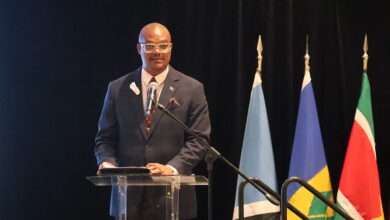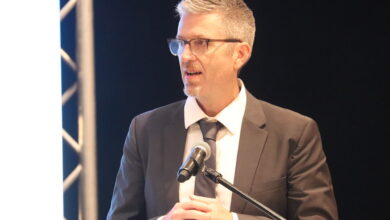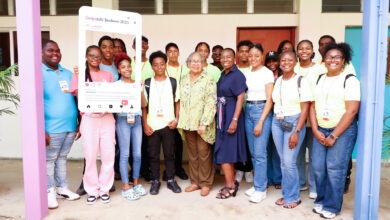This workshop takes place at an important moment in history. With last week’s MDG Summit at the United Nations in New York evaluating the progress made mid-way to reach the targets set in 2005, we find ourselves in a World where close to one billion men, women and children remain undernourished. This is unacceptable.
Let me thus be the first one here today to pledge support to the FAO’s 1 “Billion Hungry” campaign petition. And let me also be the first one to say that while in Guyana we have already achieved our MDG Target 1, that is, half the number of people living in absolute poverty have enough food for all our people, we cannot afford to be complacent. The Government of Guyana’s goal is one where every man, woman and every child will continue to have access to healthy food. For without food security we deprive our citizens the fundamental right to live fulfilling lives for we significantly compromise their ability to reach their full potential as human beings.
Over the last three years, our Region has been confronted with numerous and manifold challenges that have affected our ability to provide our people with physical and economic access to sufficient, safe and nutritious food that meet their dietary needs and food preferences for an active and healthy life.
To mention but a few of these, with the recent increase in wheat and corn prices, images from the 2008 Food Price Crisis which saw the prices of key agriculture commodities skyrocket in the span of a few months, have become vivid again. The global economic downturn, which has affected our Region mostly through its impact on remittances and tourism with knock-on effects on the agriculture sector, reminded us how exposed our Region is to the global environment. Natural calamities, brought on by climate change have further compounded our Region’s ability to attain food security, as well as continued difficulties brought on by pests and diseases.
What have we done as a Region over the past few years that we have been battered again and again by these various challenges to ensure that our agriculture sectors are robust to these shocks? What have we done to ensure that we take advantage of the new opportunities that are opening up globally? Take the current surge in agriculture prices. Despite ample global shocks, nominal wheat prices have shot up by 56 % over the last two months, with knock-on effects on substitute commodities such as sorghum and maize which rose by 7-8%. How have we in the Region made sure that we will not be adversely impacted by these rises, even if they are short-lived? If we cannot produce these commodities efficiently, how have we made sure that we are able to export other agricultural commodities that will give us the required foreign exchange earnings that we can use to pay for increased prices?
In Guyana, we have been investing heavily in the Agriculture Sector. And we are moving to transform the sector through diversification as provided for in our Grow More Food campaign. For Example, in addition to our constant efforts at making the sugar and rice industries more productive and competitive, we are in the process of rolling out over US $50 million worth of dedicated projects that aim to support the so-called “non-traditional sectors.” And our efforts are bearing fruit, as has been independently established by the FAO and other organisations. What is more, the Ministry of Agriculture has now developed a 10-year Food and Nutrition Security Strategy, which will help us not only address availability, but also access, affordability, nutrition and stability.
But with the exception of Guyana and a handful of countries in CARICOM, I am yet to see decisive action and coordination at the political level. And that, together with seeming institutional weaknesses and inadequate coordination between Member States and the CARICOM Secretariat is what has kept the region from comprehensively and decisively address Key Binding Constrains identified in the Jagdeo Initiative.
Ladies and Gentlemen, today’s validation workshop cannot be just another talkshop producing endless amounts of papers that end up on dusty shelves and are then only taken down to be copy-pasted into another set of documents for another talkshop a few months or years down the line. The talk is over now.
I want to see the workshop focus on the objective of agreeing to key policy actions and programmes to move the Region tangibly towards improved and sustainable food security with the next 5 years, and take these to the relevant organs within CARICOM for approval and subsequent implementation. For regional food security, apart from being an end in itself given its centrality to our people, it is also the foundation of the region’s stability, security and continued prosperity.
The RFPNS has successfully addressed most of the factors affecting the food security in the Region, but the workshop must now go over the document again and ensure that all key areas of concern have been satisfactorily addressed.
The first area of concern in my view is our continued reliance on food imports, which instead of reducing has actually been increasing. We tiny Caribbean nations, as recently as twenty years ago accounted for more than two percent of the world’s agricultural trade. Our share has declined to less than 0.3 percent today. Our net agricultural trade was in surplus then – standing at around 3 billion US dollars. Today we are in deficit, paying over US$3.5 billion annually to import our food. What is worth noting is that these shifting trade patterns have not only impacted our Region economically. They have also exacerbated economic inequalities and fed poverty, thus contributing towards the Region’s security challenges. This strategy must thus work towards removing barriers that our Region now face in international trade and take into account socio-economic impacts.
The second area of concern is our people’s unhealthy and costly tastes, which not only mean that we have to spend our exchange earnings to pay for the import of highly processed and unhealthy products, but we also have to deal with the resulting health-related problems, which affect our region’s productivity and human capital. The strategy therefore has to incorporate nutritional aspects and place emphasis on our Region consuming what it produces.
The third area of concern is climate change and our overall agricultural risk management strategies shielding us from the vagaries of adverse weather, pests and diseases and the myriad factors that are outside the control of the farmer, but in one instant, wipe out a whole season’s worth of labour and inputs and compromise local, national and regional food security. The strategy therefore must be a strategy that will help deliver food security not just in 3 or 5 years time, but also set the foundation for long-term sustainable agricultural development models. For we cannot afford to invest in a strategy that will be outdated in a few years.
The fourth area of concern is our institutional and business model. We must link more closely with the private sector and consider the whole value chain, while integrating our approaches to land, water management, trade, transport and distribution, employment creating and improving our business environment.
Finally, the most important area of concern is looking at why such attempts have not worked in the past. I want to know how this strategy will drive forward the Jagdeo Initiative and address not only the key constraints identified under the Initiative, but also the constraints that exist in delivering on it. Unless it does so, it will be another futile effort and waste of our time, no matter how well written and articulated, no matter how good its proposals are.
With these few thoughts, I will not add to the heavy talking but allow the workshop to get into action. I urge all countries present to see this strategy as an opportunity to rally benefits from the value of regional integration and put effort into ensuring that the action plan emanating from its is outcome based, time-bound, achievable, but above all ambitious and visionary.
For this workshop is the very occasion for countries like Guyana that have the vision of being the food-basket of the Caribbean, while fostering agricultural development and trade, accessibility to quality nutritious food for consumers and protection and resilience against adversities, to make the vision a reality, together with our fellow CARICOM Member States. We cannot afford to miss this opportunity again. The moral imperative to ensure that our Region and every man, woman and child within it are food secured is not a choice – it is an imperative.
Thank You





